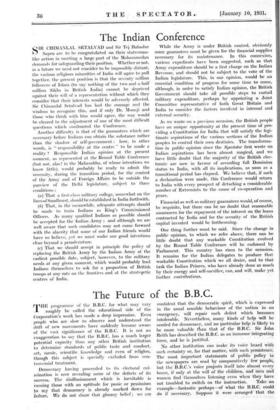The Indian Conference
QIR CHIMANLAL SETALVAD and Sir Tej Bahadur Sapru arc to be congratulated on their statesman- like action in meeting a large part of the Mohammedan demands for safeguarding their position. Whether or not, in a future we need not consider to be impossibly distant, the various religious minorities of India will agree to pull together, the present position is that the seventy million followers of Islam (to say nothing of the two and a-half million Sikhs in British India) cannot he deprived followers of Islam (to say nothing of the two and a-half million Sikhs in British India) cannot he deprived against their will of a representation without which they consider that their interests would be adversely affected. Sir Chimanlal Setalvad has had the courage and the wisdom to recognize this, and if only Dr. Moonji and those who think with him would agree, the way would be cleared to the adjustment of one of the most difficult questions which confronted the Conference.
Another difficulty is that of the guarantees which are necessary before Indians can obtain the substance rather than the shadow of self-government : how, in other words, is " responsibility at the centre " to be made a reality ? Responsible Indian opinion at the present moment, as represented at the Round Table Conference (but not, alas ! in the Mahasabha, of whose intentions we know little), would Probably be ready to admit the necessity, during the transition period, for the control of the Army and of Foreign Affairs to be outside the purview of the Delhi legislature, subject to three conditions : (a) That a first-class military college, somewhat on the lines of Sandhurst, should be established in India forthwith.
(b) That, in the Meanwhile, adequate attempts should be made to train Indians as King's Commissioned Officers: As many qualified Indians as possible should be accepted for the Indian Army ; and although we are well aware that such candidates may not come forward with the alacrity that some of our Indian friends would have us believe, yet we must make our good intentions clear beyond a peradventure.
(c) That we should accept in principle the policy of replacing the British Army by the Indian Army at the earliest possible date, subject, however, to the military needs at any given moment, which would probably lead Indians themselves to ask for a proportion of British troops at any rate on the frontiers and at the strategetic centres of India. While the Army is under British control, obviously some guarantees must be given for- the financial supplies necessary for its maintenance. In this connexion, various expedients have been suggested, such as that Army expenditure should be a first.charge on the Indian Revenue, and should not be subject to the vote of the Indian legislature. This, in our opinion, would be an essential condition of progress for some time to come, although, in order to satisfy. Indian opinion, the British Government should take all possible steps to curtail military expenditure, perhaps by • appointing a Joint Committee representative of both Great Britain and India to consider the factors involved in internal and external security.
As we wrote on a previous occasion, the British people have an unique opportunity at the present time of pro- viding a Constitution for India that will satisfy the legi- timate aspirations of the various sections of the Indian peoples to control their own destinies. The transforma- tion in public opinion since the Spectator first wrote on Indian aspirations has been almost magical, and we have little doubt that the majority of the British elec- torate are now in favour of according full Dominion status to India, with all its implications, as soon as a transitional period has elapsed. We believe that, if such a declaration were made, this Conference would return to India with every prospect of detaching a considerable number of Extremists to the cause of co-operation and peace.
Financial as well as military guarantees would, of course, be requisite, but there can be no doubt that reasonable assurances for the repayment of the interest on the loans contracted by India and for the security of the British capital invested would be forthcoming.
One thing further must be said. Since the change in public opinion, to which we refer above, there can be little doubt that any workable Constitution _evolved by the Round Table Conference will be endorsed by Parliament. This country has risen to the occasion. It remains for the Indian delegates to produce that workable Constitution which we all desire, and to that task the Indian Princes, who have already done so much by their energy and self-sacrifice, can, and will, make yet further contributions.


































 Previous page
Previous page